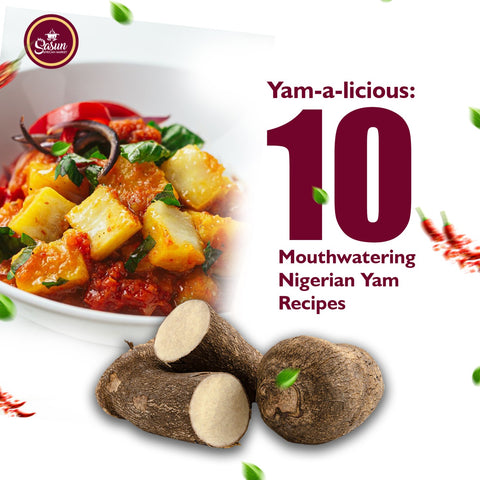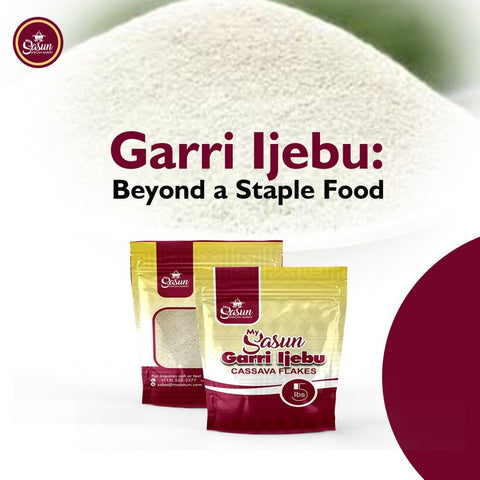Africa is a continent rich in diverse cultures, landscapes, and cuisines. From the lush forests of Central Africa to the savannas of East Africa and the vibrant markets of West Africa, each region boasts its own array of nutrient-rich superfoods that have been nourishing communities for centuries. In this blog post, we'll explore 15 African superfoods that you need to try for their incredible flavors and health benefits. Some of these superfoods, you can get at your number one African Groceries store in the US- My Sasun African Market. What are these superfoods?
Also Read: 5 ESSENTIAL NUTRIENTS FROM AFRICAN FOODS
1. Baobab:
- Description: The baobab tree, also known as the "tree of life," produces large fruit pods filled with a powdery pulp that is tangy and slightly sweet.
- Nutritional Benefits: Baobab fruit is incredibly nutritious, containing high levels of vitamin C, antioxidants, and dietary fiber. It also provides essential minerals like calcium, potassium, and magnesium.
- Health Benefits: Consuming baobab fruit may support immune function, promote digestive health, and help regulate blood sugar levels. Its high antioxidant content can also protect against oxidative stress and inflammation.
- Usage: Baobab fruit powder can be added to smoothies, juices, yogurt, or baked goods for a nutritional boost. It's also used in traditional African remedies for various health ailments.
2. Moringa:
- Description: Moringa is a fast-growing tree native to parts of Africa and Asia, known for its highly nutritious leaves.
- Nutritional Benefits: Moringa leaves are rich in vitamins A, C, and E, as well as essential minerals like calcium, iron, and potassium. They also contain all nine essential amino acids, making them a complete protein source.
- Health Benefits: Incorporating moringa into the diet may help boost energy levels, support immune function, and improve overall nutritional status. It has also been studied for its potential anti-inflammatory and antioxidant properties.
- Usage: Moringa leaves can be used fresh or dried and added to soups, stews, salads, or brewed as a tea. Moringa powder is also available and can be mixed into smoothies or sprinkled over dishes.
Also Read: HOW TO MAKE YOUR PICKY CHILD ENJOY AFRICAN FOODS
3. Teff:
- Description: Teff is a tiny grain native to Ethiopia and Eritrea, where it's been cultivated for thousands of years.
- Nutritional Benefits: Despite its small size, teff is packed with nutrients, including protein, dietary fiber, iron, calcium, and essential amino acids like lysine. It's also gluten-free, making it suitable for those with gluten sensitivities.
- Health Benefits: Teff is a good source of energy and may help regulate blood sugar levels due to its low glycemic index. Its high fiber content promotes digestive health and may aid in weight management.
- Usage: Teff flour is used to make injera, a spongy Ethiopian flatbread that serves as a staple food in the region. Teff grains can also be cooked into porridge, added to soups, or used as a gluten-free alternative in baking.
4. Fonio:
- Description: Fonio is a small, ancient grain grown in West Africa, particularly in countries like Senegal and Mali.
- Nutritional Benefits: Despite its small size, fonio is nutrient-dense, containing protein, fiber, iron, zinc, and essential amino acids like methionine and cysteine. It's also gluten-free and easy to digest.
- Health Benefits: Fonio is considered a nutritious and sustainable crop, offering numerous health benefits such as supporting muscle growth and repair, promoting digestive health, and providing sustained energy.
- Usage: Fonio can be cooked like rice or couscous and served as a side dish or base for salads, stews, or stir-fries. It's also ground into flour for baking or used to make traditional African dishes like thiakry or fonio pudding.
Also Read: THE SURPRISING BENEFITS OF EATING MORE AFRICAN FOODS IN THE DIASPORA
5. Amaranth:
- Description: Amaranth is a leafy green vegetable and pseudocereal grain that has been cultivated for thousands of years in Africa and other parts of the world.
- Nutritional Benefits: Both the leaves and seeds of amaranth are highly nutritious. The leaves are rich in vitamins A, C, and K, as well as minerals like calcium, iron, and magnesium. The seeds are a good source of protein, dietary fiber, and essential amino acids.
- Health Benefits: Consuming amaranth may support bone health, cardiovascular health, and immune function due to its rich nutrient profile. It's also gluten-free and may help regulate blood sugar levels.
- Usage: Amaranth leaves can be cooked and eaten as a vegetable or added to soups, stews, and salads. Amaranth seeds can be cooked into porridge, popped like popcorn, or ground into flour for baking breads, pancakes, or other baked goods.
6. Shea Butter:
- Description: Shea butter is a fat extracted from the nuts of the shea tree, native to West Africa. It has been used for centuries in skincare and culinary applications.
- Nutritional Benefits: Shea butter is rich in vitamins A and E, essential fatty acids, and antioxidants like tocopherols and phenols. It also contains cinnamic acid, which provides natural UV protection.
- Health Benefits: Shea butter is highly moisturizing and nourishing for the skin, making it effective in treating dryness, eczema, and other skin conditions. It may also help reduce inflammation and promote wound healing.
- Usage: Shea butter is commonly used in skincare products such as lotions, creams, and balms for its moisturizing properties. It can also be used as a cooking fat in traditional African dishes or as a natural hair conditioner.
7. Hibiscus:
- Description: Hibiscus, also known as roselle or sorrel, is a flowering plant native to Africa and other tropical regions. Its vibrant red flowers are used to make a tart, refreshing tea.
- Nutritional Benefits: Hibiscus tea is rich in vitamin C, antioxidants, and minerals like calcium and iron. It also contains compounds known as anthocyanins, which have been linked to various health benefits.
- Health Benefits: Drinking hibiscus tea may help lower blood pressure, improve cholesterol levels, and support liver health. It's also known for its diuretic and immune-boosting properties.
Also Read: TOP 14 WEST AFRICAN FOODS FOR GUT HEALTH AND DIGESTIVE WELLNESS
8. African Mango:
- Description: African mango, also known as wild mango or bush mango or Oro in Yoruba , is a fruit native to West Africa. It has a sweet, tangy flavor and a fibrous texture.
- Nutritional Benefits: African mango is rich in dietary fiber, vitamins, minerals, and antioxidants. It contains a unique compound called Irvingia gabonensis extract, which has been studied for its potential weight loss and metabolic benefits.
- Health Benefits: Consuming African mango may help suppress appetite, reduce fat cell growth, and improve blood sugar control. It's also known for its anti-inflammatory and immune-boosting properties.
- Usage: African mango can be eaten fresh or processed into jams, jellies, juices, or dietary supplements. The seeds of the African wild mango are used to make a unique Nigerian delicacy called Ogbono soup. In Igbo, it’s referred to as “Ogbono”, while in Yoruba, it’s called "Apon". These seeds are dried and then blended with crayfish to create the flavorful soup. Besides being delicious, Ogbono soup is also known for its several health benefits
9. Bambara Groundnut:
- Description: Bambara groundnut, also known as Vigna subterranea, is a legume native to West Africa. It has been cultivated for centuries for its edible seeds, which grow underground.
- Nutritional Benefits: Bambara groundnuts are rich in protein, dietary fiber, and essential minerals like calcium, iron, and phosphorus. They also contain healthy fats and carbohydrates, making them a nutritious staple in many African diets.
- Health Benefits: Consuming Bambara groundnuts may help support muscle growth and repair, promote digestive health, and regulate blood sugar levels. Their high fiber content can also aid in weight management and reduce the risk of chronic diseases.
- Usage: Bambara groundnuts can be boiled, roasted, or ground into flour for use in various dishes. They are commonly used in soups, stews, porridges, and snacks across West Africa.
10. Sorghum:
- Description: Sorghum is a versatile cereal grain widely cultivated in Africa, Asia, and the Americas. It comes in various colors, including white, red, and brown, and is used in both food and beverage production.
- Nutritional Benefits: Sorghum is gluten-free and rich in antioxidants, dietary fiber, protein, and essential minerals like iron, phosphorus, and magnesium. It also contains phytochemicals that may have health-promoting properties.
- Health Benefits: Consuming sorghum may help reduce the risk of heart disease, support digestive health, and regulate blood sugar levels. Its antioxidant content can also protect against oxidative stress and inflammation.
- Usage: Sorghum grains can be cooked into porridge, added to soups and stews, or ground into flour for baking breads, cakes, and other baked goods. Sorghum syrup, a sweetener made from sorghum juice, is also used in traditional African recipes and beverages.
Also Read: 10 FERMENTED FOODS IN WEST AFRICA & THEIR HEALTH BENEFITS
11. Palm Fruit:
- Description: Palm fruit, also known as oil palm fruit, is the fruit of the oil palm tree native to West Africa. It has a fleshy outer layer and a hard inner kernel, which contains palm oil.
- Nutritional Benefits: Palm fruit is rich in vitamins A and E, antioxidants, and healthy fats. It also contains carotenoids, tocotrienols, and other phytonutrients that have been linked to various health benefits.
- Health Benefits: Consuming palm fruit may help improve skin health, support eye health, and protect against heart disease and cancer. Palm oil extracted from the fruit is also used in cooking and as a natural remedy in traditional African medicine.
- Usage: Palm fruit can be eaten fresh or processed into palm oil, which is used in cooking, baking, and food preparation. It's also used to make palm wine, a traditional African alcoholic beverage, and various palm-based dishes and snacks.
12. Okra:
- Description: Okra, also known as lady's finger or gumbo, is a green, pod-like vegetable native to West Africa. It has a distinct mucilaginous texture when cooked.
- Nutritional Benefits: Okra is low in calories and rich in dietary fiber, vitamins, and minerals, including vitamins A, C, and K, as well as folate, magnesium, and potassium. It also contains antioxidants like flavonoids and polyphenols.
- Health Benefits: Consuming okra may help lower cholesterol levels, regulate blood sugar levels, and promote digestive health. Its high fiber content can also aid in weight management and reduce the risk of certain diseases.
- Usage: Okra is commonly used in soups, stews, and stir-fries in African cuisine. It can also be pickled, grilled, or fried and served as a side dish or snack. Additionally, okra pods are used to thicken soups and sauces due to their mucilaginous properties.
13. Plantains:
- Description: Plantains are starchy fruits belonging to the banana family. Unlike sweet bananas, plantains are larger, have thicker skins, and are typically cooked before eating.
- Nutritional Benefits: Plantains are a good source of complex carbohydrates, dietary fiber, vitamins (especially A and C), and essential minerals like potassium. They also provide energy and support digestive health.
- Health Benefits: Consuming plantains may help regulate blood pressure, improve digestive function, and provide a sustainable source of energy. They also contain antioxidants that contribute to overall health and well-being.
- Usage: Plantains can be boiled, fried, grilled, or baked. In West African cuisine, they are often sliced and fried to make "dodo" or "kelewele." Plantains can also be used in stews, soups, and porridges, offering a versatile and nutritious addition to various dishes.
14. Coconut:
- Description: Coconuts are the fruit of the coconut palm and are well-known for their versatility. They consist of a hard shell, coconut water, and white coconut flesh.
- Nutritional Benefits: Coconuts are rich in healthy fats, particularly medium-chain triglycerides (MCTs), which are easily metabolized for energy. They also provide essential minerals like manganese, copper, and iron.
- Health Benefits: Consuming coconut may support heart health, boost metabolism, and provide quick and sustained energy. The MCTs in coconut have been associated with weight management and improved cognitive function.
- Usage: Coconuts can be used in various forms, including coconut water, coconut milk, coconut oil, and shredded coconut. Coconut water is a hydrating beverage, coconut milk is used in cooking and baking, and coconut oil is a versatile cooking oil. Shredded coconut adds flavor and texture to both sweet and savory dishes.
15. Sweet Potatoes:
- Description: Sweet potatoes are a root vegetable known for their sweet taste and vibrant colors. They come in various varieties, including orange, purple, and white.
- Nutritional Benefits: Sweet potatoes are rich in beta-carotene, a precursor to vitamin A, as well as vitamin C, fiber, and various minerals. They provide complex carbohydrates, making them a nutritious and filling food.
- Health Benefits: Consuming sweet potatoes may support eye health, boost the immune system, and regulate blood sugar levels. The antioxidants in sweet potatoes also contribute to overall health and may protect against chronic diseases.
- Usage: Sweet potatoes can be roasted, boiled, mashed, or baked. They are used in a variety of dishes, including stews, soups, and casseroles. Sweet potato fries and pies are popular treats, showcasing the vegetable's versatility in both sweet and savory applications.
Rounding Off
If you're curious about adding some zing and zest to your meals while packing in a punch of health benefits, you've got to check out these 15 African superfoods. They're not just about bold flavors; they're about feeling good, staying strong, and enjoying the rich tastes that Africa has to offer.
And guess what? Getting your hands on these goodies is super easy. Head over to My Sasun African Store and we'll deliver these African delights right to your doorstep in the US and Canada. Plus, if you're around Celina or Houston, pop into our stores and say hi! We'd love to meet fellow food adventurers face-to-face. So, what are you waiting for? Dive into the delicious world of African superfoods with us!







Comments (5)
First, I want to complement this page administrator for creating this platform for us to express our feelings. Herpes is a serious and recurring disease which can’t be cured through drugs or injections by the American doctors but the best way to deal with herpes is by taking natural herbs medicine from DR. Akhimien is the greatest herbalist doctor in the world and there are only a few American doctors that know about this herbal medicine from Dr Akhimien.. I have read about Dr Akhimien the great herbalist doctor from Africa who can cure disease with his powerful herbal medicine. For the people suffering from the following diseases, Herpes, HIV/Aids, Cancer, Also, Hepatitis, Diabetes, Hpv, Infections ETC should contact him for his herbal medicine because I am a living testimony and I was cured of herpes. Although, I sent him what he requested and he sent me his medicine through the UPS courier delivery company which I took for 3 weeks. today when I went for a test I tested herpes negative. You can reach him through his email {drakhiniemodion@gmail.com} or WhatsApp him at +2349133157031 Or website is https://drakhiniemodion.wixsite.com/drakhimien
Am here to let the whole world know that I was diagnose of herpes 3 years ago where all hope was lost and I had nothing to do about it,I just accepted the faith that one day I will cure of this disease and I just pray everyday for a helper and one day my sister introduce me to a herbal doctor man called Dr ahonsie that she saw him on internet well I contact him on his email,I was not fully convinced until he sent me the herbal medicine which he ask me to take for two weeks I took it with faith and i went for a retest in different hospitals and today am cured of this disease and am also using this medium to let all those having STD,like herpes and the rest not to give up,their is a man who can cure you,his name is Dr ahonsie . contact the great herbalist via his Email: drahonsie00@gmail.com / WhatsApp: +2348039482367. https://drahonsie002.wixsite.com/dr-ahonsie
Hello everyone, i have a very important information about herpes virus, i was a victim of hsv1&2 until i met doctor Ahonsie, it still feels like a dream to me. it has been two years now, i have not experience any breakout of herpes. I new about him through a post made on social media, a lady shares her experience and then i decided to contact him and ever since i contacted i was encourage and with no doubt i was cured from herpes simplex in just two weeks. He also treat other illnesses like HPV, HIV, CANCER, THYRIOD, PENIS ENLARGEMENT, and more contact him via Email: drahonsie00@gmail.com / WhatsApp: +2348039482367. https://drahonsie002.wixsite.com/dr-ahonsie https://www.facebook.com/drstellaherbalhome?mibextid=ZbWKwLThanks
I thought the physicians says there is no cure for HSV 2!!! I am telling you today that Dr ahonsie cure HSV 2 with his herbal medicine and once you get cured you are cured forever it is never reversible, I have been suffering for this deadly disease called h HSV 2 for more than a 2years and lost all hope because my doctor says there is no cure for HSV 2. Brethren I saw a testimony on the internet on how Dr ahonsie cure HSV, Hapatitis etc with his herbal medication and an email and watsapp to contact him was also displayed, I thought this was joke but I decided to contact him and he replied telling me not to worry that my problem is over . Dr ahonsie sent me a herbal medication to drink for one month but only 2weeks I feel strange and I went to my doctor and he confirmed me negative. He can help you too. Contact him drahonsie00@gmail.com or whatsapp +2348039482367 https://drahonsie002.wixsite.com/dr-ahonsie https://www.facebook.com/drstellaherbalhome?mibextid=ZbWKwL
My purpose out here today is to share this article to the world about how Doctor Odunga helped me in getting back my EX-boyfriend who broke up with me 4 months ago. I tried all I could to make him see reasons with me so that we can continue our relationship but he denied me. Thank God for giving me the thought of going into the internet for help, I searched properly and I saw different reviews of Doctor Odunga and I insisted on giving it a try by contacting him via what’s app on (+2348167159012). He gave me reason to live again and he prepared a spell and told me that my Ex-boyfriend will come back to me within 11 hours. Can you believe it, my EX-boyfriend came back to me, proposed to me and our wedding will be held soon. Contact him now!!! if you need any help. Email: odungaspelltemple@gmail.com and he does a lot of spells. Once again i want to say am very grateful for your help